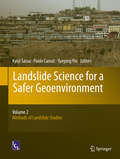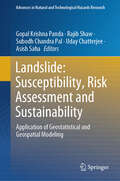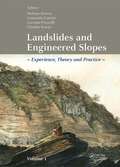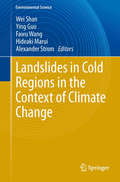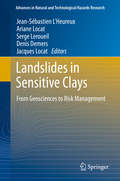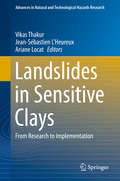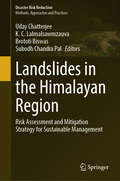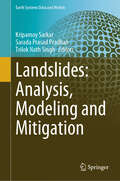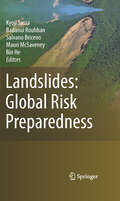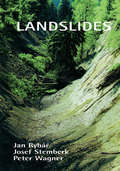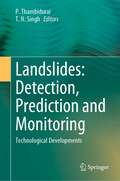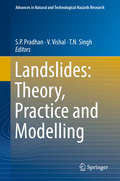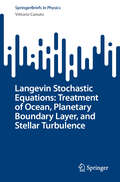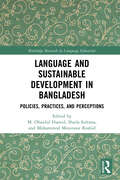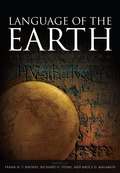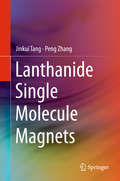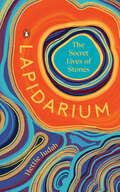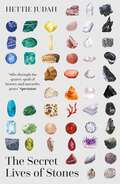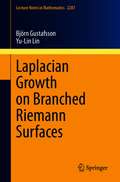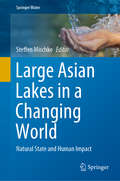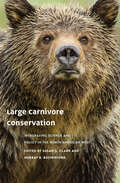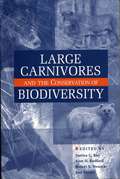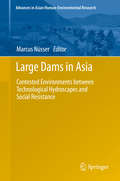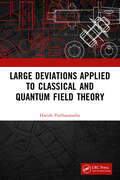- Table View
- List View
Landslide Science for a Safer Geoenvironment
by Kyoji Sassa Paolo Canuti Yueping YinThis volume contains peer-reviewed papers from the Third World Landslide Forum organized by the International Consortium on Landslides (ICL) in June 2014. The complete collection of papers from the Forum is published in three full-color volumes and one mono-color volume.
Landslide: Application of Geostatistical and Geospatial Modeling (Advances in Natural and Technological Hazards Research #52)
by Rajib Shaw Uday Chatterjee Subodh Chandra Pal Gopal Krishna Panda Asish SahaThe book illustrates a geospatial and geostatistical approach to data analysis, modeling, risk assessment, and visualization, as well as landslide hazard management in the hilly region. This book investigates cutting-edge methodologies based on open source software and R statistical programming and modeling in current decision-making procedures, with a particular emphasis on recent advances in data mining techniques and robust modeling in torrential rainfall and earthquake induced landslide hazard.
Landslides
by John J. Clague Douglas SteadLandslides have geological causes but can be triggered by natural processes (rainfall, snowmelt, erosion and earthquakes) or by human actions such as agriculture and construction. Research aimed at better understanding slope stability and failure has accelerated in recent years, accompanied by basic field research and numerical modeling of slope failure processes, mechanisms of debris movement, and landslide causes and triggers. Written by 75 world-leading researchers and practitioners, this book provides a state-of-the-art summary of landslide science. It features both field geology and engineering approaches, as well as modeling of slope failure and run-out using a variety of numerical codes. It is illustrated with international case studies integrating geological, geotechnical and remote sensing studies and includes recent slope investigations in North America, Europe and Asia. This is an essential reference for researchers and graduate students in geomorphology, engineering geology, geotechnical engineering and geophysics, as well as professionals in natural hazard analysis.
Landslides and Engineered Slopes. Experience, Theory and Practice: Proceedings of the 12th International Symposium on Landslides (Napoli, Italy, 12-19 June 2016)
by Stefano Aversa, Leonardo Cascini, Luciano Picarelli and Claudio ScaviaLandslides and Engineered Slopes. Experience, Theory and Practice contains the invited lectures and all papers presented at the 12th International Symposium on Landslides, (Naples, Italy, 12-19 June 2016). The book aims to emphasize the relationship between landslides and other natural hazards. Hence, three of the main sessions focus on Volcanic-induced landslides, Earthquake-induced landslides and Weather-induced landslides respectively, while the fourth main session deals with Human-induced landslides. Some papers presented in a special session devoted to "Subareal and submarine landslide processes and hazard” and in a “Young Session” complete the books. Landslides and Engineered Slopes. Experience, Theory and Practice underlines the importance of the classic approach of modern science, which moves from experience to theory, as the basic instrument to study landslides. Experience is the key to understand the natural phenomena focusing on all the factors that play a major role. Theory is the instrument to manage the data provided by experience following a mathematical approach; this allows not only to clarify the nature and the deep causes of phenomena but mostly, to predict future and, if required, manage similar events. Practical benefits from the results of theory to protect people and man-made works. Landslides and Engineered Slopes. Experience, Theory and Practice is useful to scientists and practitioners working in the areas of rock and soil mechanics, geotechnical engineering, engineering geology and geology.
Landslides in Cold Regions in the Context of Climate Change
by Fawu Wang Alexander Strom Wei Shan Ying Guo Hideaki MaruiLandslides in cold regions have different mechanisms from those in other areas, and comparatively few research efforts have been made in this field. Recently, because of climate change, some new trends concerning landslide occurrence and motion have appeared, severely impacting economic development and communities. This book collects key case studies from the cold regions all over the world, providing an overview of the general situation.
Landslides in Sensitive Clays
by Jean-Sébastien L'Heureux Ariane Locat Serge Leroueil Denis Demers Jacques LocatLandslides in sensitive clays represent a major hazard in the northern countries of the world such as Canada, Finland, Norway, Russia, Sweden and in the US state of Alaska. Past and recent examples of catastrophic landslides at e. g. Saint-Jean-Vianney in 1971, Rissa in 1979, Finneidfjord in 1996 and Kattmarka in 2009 have illustrated the great mobility of the remolded sensitive clays and their hazardous retrogressive potential. These events call for a better understanding of landslide in sensitive clay terrain to assist authorities with state-of-the-art hazard assessment methods, risk management schemes, mitigation measures and planning. During the last decades the elevated awareness regarding slope movement in sensitive clays has led to major advances in mapping techniques and development of highly sophisticated geotechnical and geophysical investigation tools. Great advances in numerical techniques dealing with progressive failure and landslide kinematic have also lead to increase understanding and predictability of landslides in sensitive clays and their consequences. This volume consists of the latest scientific research by international experts dealing with geological, geotechnical and geophysical aspects of slope failure in sensitive clays and focuses on understanding the full spectrum of challenges presented by landslides in such brittle materials.
Landslides in Sensitive Clays
by Ariane Locat Vikas Thakur Jean-Sébastien L’heureuxThis book gathers the most recent scientific research on the geological, geotechnical and geophysical aspects of slope failure in sensitive clays. Gathering contributions by international experts, it focuses on understanding the complete and practical spectrum of challenges presented by landslides in such complex materials. Based on sound and validated research results, the book also presents several recommendations that could be implemented in the guidelines or code-of-practice. These recommendations cover topics including the characterization and behavior of sensitive clays; the pre-failure, failure and post-failure stages of sensitive clays; mapping and identification methods; climate change; hazard assessment; and risk management. Sensitive clays are known for their potential for causing large landslides, which pose a serious risk to human lives, infrastructure, and surrounding ecosystems within their reach. This has been demonstrated by the recent catastrophic landslides in e. g. S#65533;rum (2016), Skjeggestad (2015), Statland (2014), Byneset (2012), St-Jude (2010), Lyngen (2010) and Kattmarka (2009). The 2015 collapse of the Skjeggestad Bridge in Norway - which was due to a landslide in sensitive clay - alone costs millions of dollars in repairs. Recently, efforts are being made to increase society's ability to cope with such landslide hazards. Geoscientists are now expected to provide input to the agencies responsible for landslide-risk preparedness. In other words, geoscientists' role is not only to act as technologists to establish new theories, but also to go the extra mile to implement them in practice, so as to find meaningful solutions to geotechnical problems.
Landslides in the Himalayan Region: Risk Assessment and Mitigation Strategy for Sustainable Management (Disaster Risk Reduction)
by Uday Chatterjee K. C. Lalmalsawmzauva Subodh Chandra Pal Brototi BiswasThis book explores a platform for insightful discussions and scientific discourse on various aspects of landslides and their risk management, with insights focused on the Himalayan states at a sub-regional level. A fundamental reference is thus provided for further research not only in landslides but also in associated natural hazards. The book is divided into four major parts, starting from conceptual models in approaching landslide risk, followed by evaluation of risk, management of landslide risk, end-to-end solutions for landslide risk assessment, and a synopsis. Included are topics such as the nature of landslide hazard impact, scale dependency in landslide hazard and risk analysis, and systematic procedures of landslide hazard mapping for risk assessment using spatial prediction models. The book also covers such important aspects as the response of the insurance industry to landslide risk and the role of administrative bodies in landslide risk assessment and sustainable management. Readers gain ample knowledge through case studies regarding the types of landslides in the Himalayan region, which will help them in their future research hypotheses.
Landslides: Analysis, Modeling and Mitigation (Earth Systems Data and Models #7)
by Kripamoy Sarkar Trilok Nath Singh Sarada Prasad PradhanThe book aims to enhance understanding of landslides by focusing on detection, prediction, and monitoring. Recently, the number of significant landslides and the damage they cause has increased globally. Landslides are among the most devastating natural hazards, resulting in widespread damage to habitats on local, regional, and global scales. Experts from around the world have shared their experiences in landslide research and practice, which may help stakeholders mitigate and predict these events. The book comprises chapters on ✔ Dynamics, mechanisms, and processes of landslides. ✔ Mapping and assessment of hazard, vulnerability, and risk associated with landslides. ✔ Geological, geotechnical, hydrological, and geophysical modelling for landslides. ✔ Numerical simulation of slope to analyse their stability. ✔ Monitoring and early warning of landslides. ✔ Application of remote sensing and GIS techniques in monitoring and assessment of landslides. The book is very much helpful for researchers, practitioners, and decision-makers to adapt suitable modern techniques for landslide study.
Landslides: Global Risk Preparedness
by Bin He Kyoji Sassa Badaoui Rouhban Mauri Mcsaveney Sálvano BriceñoThis book presents the global landslide risk preparedness implemented through the International Programme on Landslides (IPL). IPL was initiated by the International Consortium on Landslides (ICL) in 2002, and developed to a joint international programme by the IPL Global Promotion Committee (UNESCO, WMO, FAO, UNISDR, UNU, ICSU and WFEO as well as ICL) through the 2006 Tokyo Action Plan. The materials consists of four parts: Outline of the International Programme on Landslides & IPL Global Promotion Committee; Achievements of major IPL projects in research and capacity building; World Centres of Excellence on Landslide Risk Reduction (WCoEs) and Landslide School Network; Key documents of IPL and ICL including Tokyo Action Plan, Application of ICL, IPL Projects, WCoEs and Landslide School Network
Landslides: Proceedings of the First European Conference on Landslides, Prague, Czech Republic, 24-26 June 2002
by Peter Wagner Jan Rybář Josef StemberkThe proceedings contain five invited lectures and 99 papers relevant to landslide occurrence and problems from Europe, Asia, America, Africa and Australia and New Zealand. The five special invited lectures deal with a variety of important aspects of landslides.
Landslides: Technological Developments
by T. N. Singh P. ThambiduraiThis book intends to decipher the knowledge in the advancement of understanding, detecting, predicting, and monitoring landslides. The number of massive landslides and the damages they cause has increased across the globe in recent times. It is one of the most devastating natural hazards that cause widespread damage to habitat on a local, regional, and global scale. International experts provide their experience in landslide research and practice to help stakeholders mitigate and predict potential landslides. The book comprises chapters on: Dynamics, mechanisms, and processes of landslides; Geological, geotechnical, hydrological, and geophysical modelling for landslides; Mapping and assessment of hazard, vulnerability, and risk associated with landslides; Monitoring and early warning of landslides; Application of remote sensing and GIS techniques in monitoring and assessment of landslides. The book will be of interest to researchers, practitioners, and decision-makers in adapting suitable modern techniques for landslide study.
Landslides: Theory, Practice and Modelling (Advances in Natural and Technological Hazards Research #50)
by V. Vishal T. N. Singh S. P. PradhanThis book, with contributions from international landslide experts, presents in-depth knowledge of theories, practices, and modern numerical techniques for landslide analysis. Landslides are a reoccurring problem across the world and need to be properly studied for their mitigation and control. Due to increased natural and anthropogenic activities, chances of landslide occurrence and associated hazards have increased. The book focuses on landslide dynamics, mechanisms and processes along with hazard mitigation using geo-engineering, structural, geophysical and numerical tools. The book contains a wealth of the latest information on all aspects of theory, practices and modelling tools and techniques involved in prediction, prevention, monitoring, mitigation and risk analysis of landslide hazards. This book will bring the reader up to date on the latest trends in landslide studies and will help planners, engineers, scientists and researchers working on landslide engineering.
Langevin Stochastic Equations: Treatment of Ocean, Planetary Boundary Layer, and Stellar Turbulence (SpringerBriefs in Physics)
by Vittorio CanutoThis book derives, solves, and assesses the Langevin Stochastic Equations (LSE) as a tool for treating turbulent flows. Previous work has demonstrated the LSE's ability to successfully describe non-geophysical turbulent flows. However, this book specifically focuses on geophysical flows. Chapter I addresses the modeling of oceanic mesoscales (M) and sub-mesoscales (SM), while Chapter II discusses vertical mixing. The target audience for this book is advanced students and researchers interested in future climate change and the crucial role played by the ocean. One of the main challenges in describing oceanic M and SM is that they are governed by non-linear interactions for which no satisfactory model exists. Despite the unsuccessful attempts to describe non-linearity using the traditional Navier-Stokes Equations (NSE), heuristic models continue to be used. This has created a dilemma: while future climate projections need to be predictive, the heuristic treatment of M and SM lacks predictive power, leading to an internal inconsistency. The primary goal of this book is to demonstrate that the transition from NSE to LSE resolves this inconsistency, paving the way for a fully predictive treatment of M and SM. This advancement is crucial for providing future climate predictions with the credibility they require.
Language and Sustainable Development in Bangladesh: Policies, Practices, and Perceptions (Routledge Research in Language Education)
by Shaila Sultana Mohammod Moninoor Roshid M. Obaidul HamidThis book examines relationships between language and sustainable development in the context of Bangladesh. Following inclusive and multidisciplinary perspectives, these relationships are explored in mainstream education, teacher education, religious education and indigenous, ethnic minority and refugee settings. The contexts of development are also diverse which include the public sector, international non-government organisations, domestic work, tourism, and the environment.The book records voices of people from various linguistic, social, cultural, and demographic backgrounds, in urban, rural, and peripheral settings. It makes the language question visible in the manifold contexts of development where it has generally remained invisible. Giving visibility to language by referring to the Sustainable Development Goals (SDGs), the chapters embrace language and development in pluralistic ways and underscore their complex but undeniable relationships. The authors come from diverse backgrounds and bring plurality of genres, methods, insights, and implications.The volume is intended for students, academics, researchers, policy personnel, language practitioners, and other readers whose works and interests straddle language, development, and SDGs. It will benefit them by explicating language-sustainable development relationships in theoretical as well as practical ways, suggesting directives for policies and practices for linguistic and social justice, and equity and inclusion.
Language of the Earth: A Literary Anthology
by Bruce D. Malamud Richard O. Stone Frank H.t. RhodesMan's complex relationship to planet Earth is explored in this second edition of the landmark anthology edited by Frank Rhodes and Bruce Malamud. This volume provides a portrait of the planet as experienced not just by scientists, but by artists, aviators, poets, philosophers, novelists, historians, and sociologists as well. A unique collection that bridges the gap between science and humanities Contains writings by scientists, artists, aviators, poets, philosophers, novelists, historians, and sociologists including Charles Darwin, Dane Picard, Rachel Carson, John Muir, Mark Twain and Archibald Geikie Represents the human experience over the centuries, covering a span of 2,500 years Reflects the planet's extraordinary physical diversity The previous edition was voted one of the 25 'Great Books of Geology' by readers of the Journal of Geological Education "...this is a very worthwhile read, with something for everyone interested in geography, earth systems and geology, natural history or the general environment." Robert A. Francis, King's College London, Progress in Physical Geography
Lanthanide Single Molecule Magnets
by Peng Zhang Jinkui TangThis book begins by providing basic information on single-molecule magnets (SMMs), covering the magnetism of lanthanide, the characterization and relaxation dynamics of SMMs and advanced means of studying lanthanide SMMs. It then systematically introduces lanthanide SMMs ranging from mononuclear and dinuclear to polynuclear complexes, classifying them and highlighting those SMMs with high barrier and blocking temperatures - an approach that provides some very valuable indicators for the structural features needed to optimize the contribution of an Ising type spin to a molecular magnet. The final chapter presents some of the newest developments in the lanthanide SMM field, such as the design of multifunctional and stimuli-responsive magnetic materials as well as the anchoring and organization of the SMMs on surfaces. In addition, the crystal structure and magnetic data are clearly presented with a wealth of illustrations in each chapter, helping newcomers and experts alike to better grasp ongoing trends and explore new directions. Jinkui Tang is a professor at Changchun Institute of Applied Chemistry, Chinese Academy of Sciences. Peng Zhang is currently pursuing his PhD at Changchun Institute of Applied Chemistry, Chinese Academy of Sciences, with a specific focus on the molecular magnetism of lanthanide compounds under the supervision of Prof. Jinkui Tang.
Lapidarium: The Secret Lives of Stones
by Hettie JudahInspired by the lapidaries of the ancient world, this book is a beautifully designed collection of true stories about sixty different stones that have influenced our shared historyThe earliest scientists ground and processed minerals in a centuries-long quest for a mythic stone that would prolong human life. Michelangelo climbed mountains in Tuscany searching for the sugar-white marble that would yield his sculptures. Catherine the Great wore the wealth of Russia stitched in gemstones onto the front of her bodices. Through the realms of art, myth, geology, philosophy and power, the story of humanity can be told through the minerals and materials that have allowed us to evolve and create. From the Taiwanese national treasure known as the Meat-Shaped Stone to Malta&’s prehistoric &“fat lady&” temples carved in globigerina limestone to the amethyst crystals still believed to have healing powers, Lapidarium is a jewel box of sixty far-flung stones and the stories that accompany them. Together, they explore how human culture has formed stone, and the roles stone has played in forming human culture.
Lapidarium: The Secret Lives of Stones
by Hettie Judah'A delightful storybook . . . a portrait of our whole world created from the contents of the ground' Literary Review'A real cabinet of curiosities' Sunday TimesFrom the hematite used in cave paintings to the moldavite that became a TikTok sensation; from the stolen sandstone of Scone to the unexpected acoustics of Stonehenge; from crystal balls to compasses, rocks and minerals have always been central to our story.3,000 years ago Babylonians constructed lapidaries - books that tried to pin down the magical secrets of rocks. In The Secret Lives of Stones, renowned art critic Hettie Judah explores the unexpected stories behind sixty stones that have shaped and inspired human history, from Dorset fossil-hunters to Chinese philosophers, Catherine the Great to Michelangelo.Discover why alchemists sought cinnabar and sulphur. Unearth the mystery of the tuff statues of Rapa Nui, the lost amber room of Frederick of Prussia and the scandal of Flint Jack. Find out how a Greek monster created coral, moon rock explains the history of Earth's only satellite and obsidian inspired the world's favourite computer game. Stone by stone, story by fascinating story, The Secret Lives of Stones builds into a dazzling, epoch-spanning adventure through human culture, and beyond.
Laplacian Growth on Branched Riemann Surfaces (Lecture Notes in Mathematics #2287)
by Björn Gustafsson Yu-Lin LinThis book studies solutions of the Polubarinova–Galin and Löwner–Kufarev equations, which describe the evolution of a viscous fluid (Hele-Shaw) blob, after the time when these solutions have lost their physical meaning due to loss of univalence of the mapping function involved. When the mapping function is no longer locally univalent interesting phase transitions take place, leading to structural changes in the data of the solution, for example new zeros and poles in the case of rational maps. This topic intersects with several areas, including mathematical physics, potential theory and complex analysis. The text will be valuable to researchers and doctoral students interested in fluid dynamics, integrable systems, and conformal field theory.
Large Asian Lakes in a Changing World: Natural State and Human Impact (Springer Water)
by Steffen MischkeDescribing the natural state of eight important lakes in Asia and the human impact on these lake ecosystems, this book offers a valuable reference guide. Over the past several decades the Aral Sea, Dead Sea, Lake Balkhash and other major lakes in Asia have undergone significant changes with regard to their size, water level, chemical composition, and flora and fauna. Most of these changes resulted from the loss of water from tributaries (now used for irrigation farming) or increasing consumption in local industries and households. However, significant human impacts may have begun as early as 2000 years ago. In addition to the three lakes mentioned above, Lake Sevan (Armenia), the Caspian Sea (Azerbaijan, Iran, Kazakhstan, Russia, Turkmenistan), Lake Issyk-Kul (Kyrgyzstan), and Lake Lop Nur (China) are discussed as the most prominent examples of changing lake ecosystems. In contrast, an example of an almost pristine lake ecosystem is included with the report on Lake Uvs Nuur (Mongolia). For each lake, the book summarizes its origin and early geological history, and reconstructs its natural state and variability on the basis of proxy records from drilled or exposed lake sediments that have accumulated since the last ice age. The frequently observed reductions in lake level and size during most recent decades led often to significant environmental impacts in the respective lake catchments including vegetation deterioration, soil erosion and badland formation, soil salinization or the formation of sinkholes.
Large Carnivore Conservation: Integrating Science and Policy in the North American West
by Susan G. Clark Douglas Clark D. Scott Slocombe David J. Mattson Rebecca Watters Avery C. Anderson Linaya Workman William M. Pym Micheal L. Gibeau Seth M. Wilson Gregory A. Neudecker James J. Jonkel J. Daniel Oppenheimer Lauren Richie David N. Cherney Christina MilloyStrategies for protecting wolves, mountain lions, and more—by taking the human species into account as well: &“Very valuable.&”—Journal of Wildlife Management Drawing on six case studies of wolf, grizzly bear, and mountain lion conservation in habitats stretching from the Yukon to Arizona, Large Carnivore Conservation argues that conserving and coexisting with large carnivores is as much a problem of people and governance—of reconciling diverse and sometimes conflicting values, perspectives, and organizations, and of effective decision making in the public sphere—as it is a problem of animal ecology and behavior. By adopting an integrative approach, editors Susan G. Clark and Murray B. Rutherford seek to examine and understand the interrelated development of conservation science, law, and policy, as well as how these forces play out in courts, other public institutions, and the field. In combining real-world examples with discussions of conservation and policy theory, Large Carnivore Conservation not only explains how traditional management approaches have failed to meet the needs of all parties, but also highlights examples of innovative, successful strategies and provides practical recommendations for improving future conservation efforts. &“Building on decades of work, this book integrates biological knowledge with human dimensions study and charts a course for coexistence with large carnivores.&”—Douglas W. Smith, Senior Wildlife Biologist, Yellowstone National Park
Large Carnivores and the Conservation of Biodiversity
by Joel Berger Justina Ray Robert Steneck Kent H. RedfordLarge Carnivores and the Conservation of Biodiversity brings together more than thirty leading scientists and conservation practitioners to consider a key question in environmental conservation: Is the conservation of large carnivores in ecosystems that evolved with their presence equivalent to the conservation of biological diversity within those systems? Building their discussions from empirical, long-term data sets, contributors including James A. Estes, David S. Maehr, Tim McClanahan, AndrFs J. Novaro, John Terborgh, and Rosie Woodroffe explore a variety of issues surrounding the link between predation and biodiversity: What is the evidence for or against the link? Is it stronger in marine systems? What are the implications for conservation strategies? Large Carnivores and the Conservation of Biodiversity is the first detailed, broad-scale examination of the empirical evidence regarding the role of large carnivores in biodiversity conservation in both marine and terrestrial ecosystems. It contributes to a much more precise and global understanding of when, where, and whether protecting and restoring top predators will directly contribute to the conservation of biodiversity. Everyone concerned with ecology, biodiversity, or large carnivores will find this volume a unique and thought-provoking analysis and synthesis.
Large Dams in Asia
by Marcus NüsserThis book explores the multi-dimensional asymmetries of scale, time, and directions in the large dam controversy with a regional focus on Asia, especially on India and China. Whereas the concept of large-scale transformation of fluvial environments into technological hydroscapes originated in the West, widespread construction of large dams started in the countries of the Global South in the period after decolonisation. Construction and operation of large dams are amongst the most prestigious but also most sensitive development issues, often accompanied by massive resistance of adversely affected people and civil society organisations. Based on the notion of a contested politicised environment, various case studies are analysed to identify the dominant narratives and imaginations that shape the large dams debate. This volume largely contains contributions related to several subprojects from within the Cluster of Excellence 'Asia and Europe in a Global Context: Shifting Asymmetries in Cultural Flows', based at Heidelberg University, with several expert contributions from external researchers.
Large Deviations Applied to Classical and Quantum Field Theory
by Harish ParthasarathyThis book deals with a variety of problems in Physics and Engineering where the large deviation principle of probability finds application. Large deviations is a branch of probability theory dealing with approximate computation of the probabilities of rare events. It contains applications of the LDP to pattern recognition problems like analysis of the performance of the EM algorithm for optimal parameter estimation in the presence of weak noise, analysis and control of non-Abelian gauge fields in the presence of noise, and quantum gravity wherein we are concerned with perturbation to the quadratic component of the Einstein-Hilbert Hamiltonian caused by higher order nonlinear terms in the position fields and their effect on the Gibbs statistics and consequently quantum probabilities of events computed using the quantum Gibbs state. The reader will also find in this book applications of LDP to quantum filtering theory as developed by Belavkin based on the celebrated Hudson-Parthasarathy quantum stochastic calculus. Print edition not for sale in South Asia (India, Sri Lanka, Nepal, Bangladesh, Pakistan and Bhutan).
